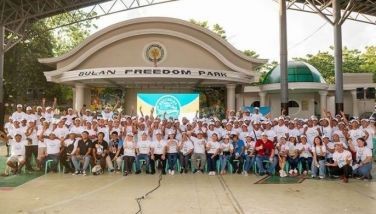CIA scandal: The end of privacy
A simple investigation on the identity of the person who was sending threatening emails to Jill Kelley, a Florida socialite, has turned into a full-blown scandal that forced the resignation of US Central Intelligence Agency chief David Petraeus whose extramarital affair with Paula Broadwell, the email sender, was discovered. But now, things are taking on an even more curious turn with US Commander in Afghanistan Gen. John Allen’s name dragged into the CIA scandal which has been dubbed “Petraeus-gate.”
Allen’s nomination as supreme commander of the NATO Allied Forces has been put on hold following revelations that he engaged in inappropriate and flirtatious email communication with Kelley, whom Broadwell thought was her romantic rival with Petraeus. Media outfits, networks, and tabloids are having a field day churning out stories not only about the Petraeus affair but every detail they could dig up about the personalities involved, including Kelley’s financial and legal woes as well as her twin sister’s negative psychological assessment.
All this goes to show just how easy it is for the FBI or the CIA to track anyone and know everything that is happening to any person in this world if they decide to focus their “Big Brother” eyes on you with “supercomputers,” “Spy-in-the-sky” satellite monitoring and other sophisticated tracking technologies. In fact, the FBI has reportedly been working on a $1-billion “Next Generation Identification Program” that can track people’s movements by automatically pinpointing a person’s face from a composite of images captured from CCTV cameras spread all over the US in street corners, subway stations, buildings, and other locations.
The project, our inside sources tell us, aims to restrict, reduce and monitor criminal and terrorist activities with the help of advanced biometric technology combined with a database that stores information about the criminal history of suspected terrorists and criminals and other so-called “persons of interest.” The advanced technology will enable law enforcement agents to sift through photos (especially those with distinct identifying features like tattoos) to pinpoint a specific individual.
Over the years, the US has been developing ultra-modern surveillance technology. A decade ago, there was the Internet surveillance system called the Carnivore which could “wiretap” email communications among suspected terrorists. The furor from groups such as the American Civil Liberties Union forced the Feds to abandon the project – although some suspect it was simply given a makeover through a more innocuous, nondescript sounding name like “DCS1000.”
Next came Einstein, a cyber monitoring tool that authorities said could detect illegal activity by analyzing Internet traffic coming in and out of government networks, with proposals to expand the FBI’s and the Department of Homeland Security’s authority to monitor even the private sector. Not surprisingly, this caused worry even among legislators who feared the potential “intrusion of privacy.”
Nowadays, it’s really getting more and more difficult for a person to remain “anonymous,” what with smartphone and other super advanced gadgets equipped with apps (secretly installed, some say) that can reveal a person’s exact location. There is widespread suspicion that calls especially in the US and Canada are being monitored – and a careless word could send undercover agents swooping down on you – allegedly with the help of telco/network providers. Google is apparently working with the CIA and the National Security Agency supposedly to investigate hackers from China. No wonder there was such resistance to the entry of Huawei – suspected of working with the Chinese intelligence to engage in cyber spying.
Critics are asking for more information about Google’s deal with the CIA, saying this could result in intrusion of privacy since almost all social networking sites (including Facebook) make use of the Google portal – leaving millions of users all over the world vulnerable particularly with Google Maps (in tandem with satellite monitoring systems) that can zero in on your exact location and peek through your home and see what’s going on even in your bathroom.
In short, technology can kill privacy – and perhaps the only way for a person to remain anonymous is to go back to the old way of transmitting messages with the use of smoke signals or personal couriers – which is what Osama bin Laden tried to do. But as it turned out, the CIA simply followed his trusted messenger to his hideout – although it did cost the US over $1.28 trillion to track the most wanted man who changed life in America forever.
Protecting online reputation
No doubt about it, the digital age is upon us. And while technological advances provided unprecedented advantages in the way people live, it has also magnified problems both for individuals and companies who could become the subject of cyber attacks from malicious individuals or groups. In more ways than one, the Internet has also become an uncontrollable medium with a potential to destroy reputations through mere gossip or insinuation.
While the Philippines’ Cybercrime Prevention Act may have questionable or objectionable provisions mainly the prison terms for the crime of libel, the proposed measure has resonated among individuals who have found themselves at the receiving end of vicious attacks that have ruined relationships, businesses and even lives, in just a matter of hours or minutes even. All it takes is a negative blog or post (from anonymous individuals or fictitious users) that can be reposted and retweeted over and over again until it becomes taken as absolute truth – resulting in damaged reputations.
Spy tidbit
Just to show you even President Noy’s private time on weekends can easily be known – somebody texted about his presence at Dusit Thani hotel last Sunday. It’s no secret that the President is a music lover, and before long word about his presence at the audio show in Dusit spread. In fact even his love life can also be easily tracked. Early on during his term somebody took a photo of him and his date at Nuvo Restaurant – and immediately tweeted about it on Twitter.
***
Email: spybits08@yahoo.com.
- Latest
- Trending































